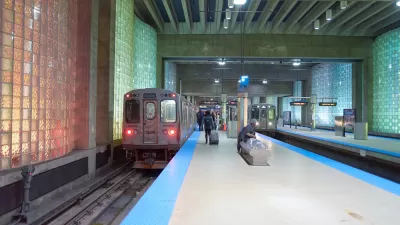A day after introducing an ambitious economic development plan for Chicago, mayor Rahm Emanuel wasted little time in unveiling a crucial element for implementing the plan - a public-private mechanism for funding infrastructure improvements.
The regional plan introduced on Wednesday, called "A Plan for Economic Growth and Jobs," "was developed by World Business Chicago, the city's non-profit economic development agency and is viewed as the first step in a continuing process to tune up the region's hefty but sluggish economic engine," reports Kathy Bergen.
The plan's 10 strategic goals, focused on encouraging greater collaboration to boost economic development, range from directives to diversify and grow the city's economic and jobs base, to ways to boost exports and develop next-generation infrastructure.
This last goal became the jumping-off point for a press conference held on Thursday, with former President Bill Clinton, to announce Emanuel's plan for a public-private mechanism called the Chicago Infrastructure Trust to fund investment in energy-efficiency improvements, transportation and other projects. The infrastructure bank, a common funding source utilized in Europe, Asia, and South America, would leverage upfront private investment to pay for public works projects that would provide a long-term revenue stream to re-pay investors and borrowers.
Emanuel has already indicated which project may be the first to utilize the new funding mechanism, report Kristen Mack and Jon Hilkevitch. "The first project on tap is roughly $200 million in energy efficiency repairs to city buildings and schools. Emanuel estimates the city can reduce its energy bill by more than $20 million a year. It would use that money to pay back the private loans, he said."
FULL STORY: Emanuel says private money could help pay for public works

Alabama: Trump Terminates Settlements for Black Communities Harmed By Raw Sewage
Trump deemed the landmark civil rights agreement “illegal DEI and environmental justice policy.”

Study: Maui’s Plan to Convert Vacation Rentals to Long-Term Housing Could Cause Nearly $1 Billion Economic Loss
The plan would reduce visitor accommodation by 25% resulting in 1,900 jobs lost.

Planetizen Federal Action Tracker
A weekly monitor of how Trump’s orders and actions are impacting planners and planning in America.

Waymo Gets Permission to Map SF’s Market Street
If allowed to operate on the traffic-restricted street, Waymo’s autonomous taxis would have a leg up over ride-hailing competitors — and counter the city’s efforts to grow bike and pedestrian on the thoroughfare.

Parklet Symposium Highlights the Success of Shared Spaces
Parklets got a boost during the Covid-19 pandemic, when the concept was translated to outdoor dining programs that offered restaurants a lifeline during the shutdown.

Federal Homelessness Agency Places Entire Staff on Leave
The U.S. Interagency Council on Homelessness is the only federal agency dedicated to preventing and ending homelessness.
Urban Design for Planners 1: Software Tools
This six-course series explores essential urban design concepts using open source software and equips planners with the tools they need to participate fully in the urban design process.
Planning for Universal Design
Learn the tools for implementing Universal Design in planning regulations.
Caltrans
Smith Gee Studio
Institute for Housing and Urban Development Studies (IHS)
City of Grandview
Harvard GSD Executive Education
Toledo-Lucas County Plan Commissions
Salt Lake City
NYU Wagner Graduate School of Public Service




























